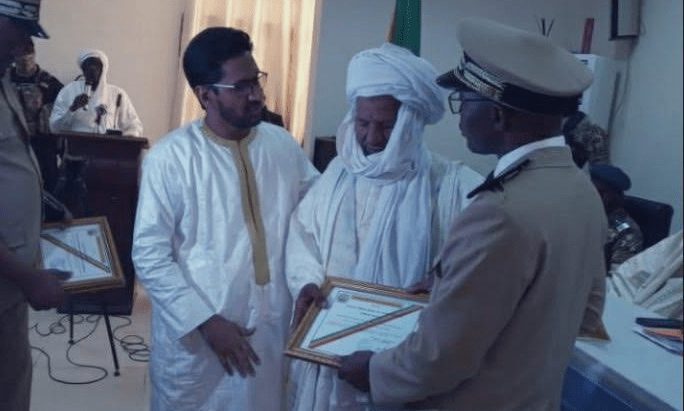On November 9, 30 or so religious and customary authorities, as well as village and neighborhood chiefs of Timbuktu received certificates of recognition from Bakoun Kante, the governor of this province of Mali, for “service rendered in favor of the return of peace and togetherness in the Timbuktu region.
But this decision by the Malian state has created controversy with the presence of Cadi Houka Houka AG Alhousseini on the list of honored personalities certainly a factor.
A former Islamic judge in Timbuktu in 2012, when Ansar Dine and Al Qaeda in the Islamic Maghreb (AQIM) jihadists ruled the northern Malian city, Houka Houka Ag Alhousseini still enjoys great influence in the city.
On October 26, in his capacity as Cadi (Muslim judge with civil, judicial and religious functions) of Zouerat, in the town of Essakane, he laid down three conditions to the governor of the Timbuktu region for the reopening of schools.
The first is to “introduce Arabic in schools, including the Koran and its interpretation in the local language and in all levels of education”.
Regarding the second cycle, the cleric also requires that the “rows of girls and boys are divided by a barrier when it is impossible to separate them in different classes.
“It is desirable that girls are taught by women and boys by men when classes are separated,” he then added, urging teachers to be visible to students according to their gender.
Yet in 2019, the United Nations Security Council imposed sanctions on Houka Houka Ag Alhousseini for obstructing the implementation of the Algiers Agreement signed in 2014 between Mali and northern rebel groups.
Arrested in January 2014 by French soldiers during the Serval intervention to dislodge jihadists from northern Mali, Houka Houka was released eight months later by the Malian authorities.
Since then, he has been living in Zouerat, a village west of Timbuktu.
According to the United Nations, he was reinstated as a teacher in September 2017 by the then governor of the Timbuktu region, Koina Ag Ahmadou, under pressure from the leader of the Coalition of the People of Azawad (CPA), Mohamed Ousmane Ag Mohamidoune.
For many observers of the security crisis that has prevailed in Mali for the past decade, granting a certificate of recognition to a former Islamic judge linked to AQIM is a sign of weakness for the Malian state.
According to a security source, “it is rather a sign of the state’s loss of sovereignty in the face of the various stakeholders.”
“Education is supposed to be the same throughout the country, but Houka Houka’s proposals to accompany the reopening of schools are in line with the social project of the GSIM (Groupe de soutien à l’Islam et aux Musulmans), which is close to AQIM,” the same sources say, anticipating that “the state will need to examine this kind of societal concession in the event of negotiations with the jihadist group.”
AC/cgd/fss/as/APA


